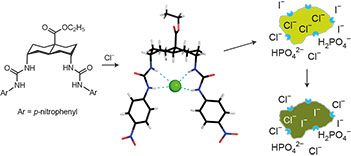
Hongyu Li, Hennie Valkenier, Luke W. Judd, Peter R. Brotherhood, Sabir Hussain, James A. Cooper, Ondřej Jurček, Hazel A. Sparkes, David N. Sheppard* & Anthony P. Davis*
Featured in as news article on Phys.org: First steps towards new therapy for diseases caused by defective anion transport. In the top 5% of all research outputs by news and social media attention on Altmetric.
Abstract
Transmembrane anion transporters (anionophores) have potential for new modes of biological activity, including therapeutic applications. In particular they might replace the activity of defective anion channels in conditions such as cystic fibrosis. However, data on the biological effects of anionophores are scarce, and it remains uncertain whether such molecules are fundamentally toxic. Here, we report a biological study of an extensive series of powerful anion carriers. Fifteen anionophores were assayed in single cells by monitoring anion transport in real time through fluorescence emission from halide-sensitive yellow fluorescent protein. A bis-(p-nitrophenyl)ureidodecalin shows especially promising activity, including deliverability, potency and persistence. Electrophysiological tests show strong effects in epithelia, close to those of natural anion channels. Toxicity assays yield negative results in three cell lines, suggesting that promotion of anion transport may not be deleterious to cells. We therefore conclude that synthetic anion carriers are realistic candidates for further investigation as treatments for cystic fibrosis..